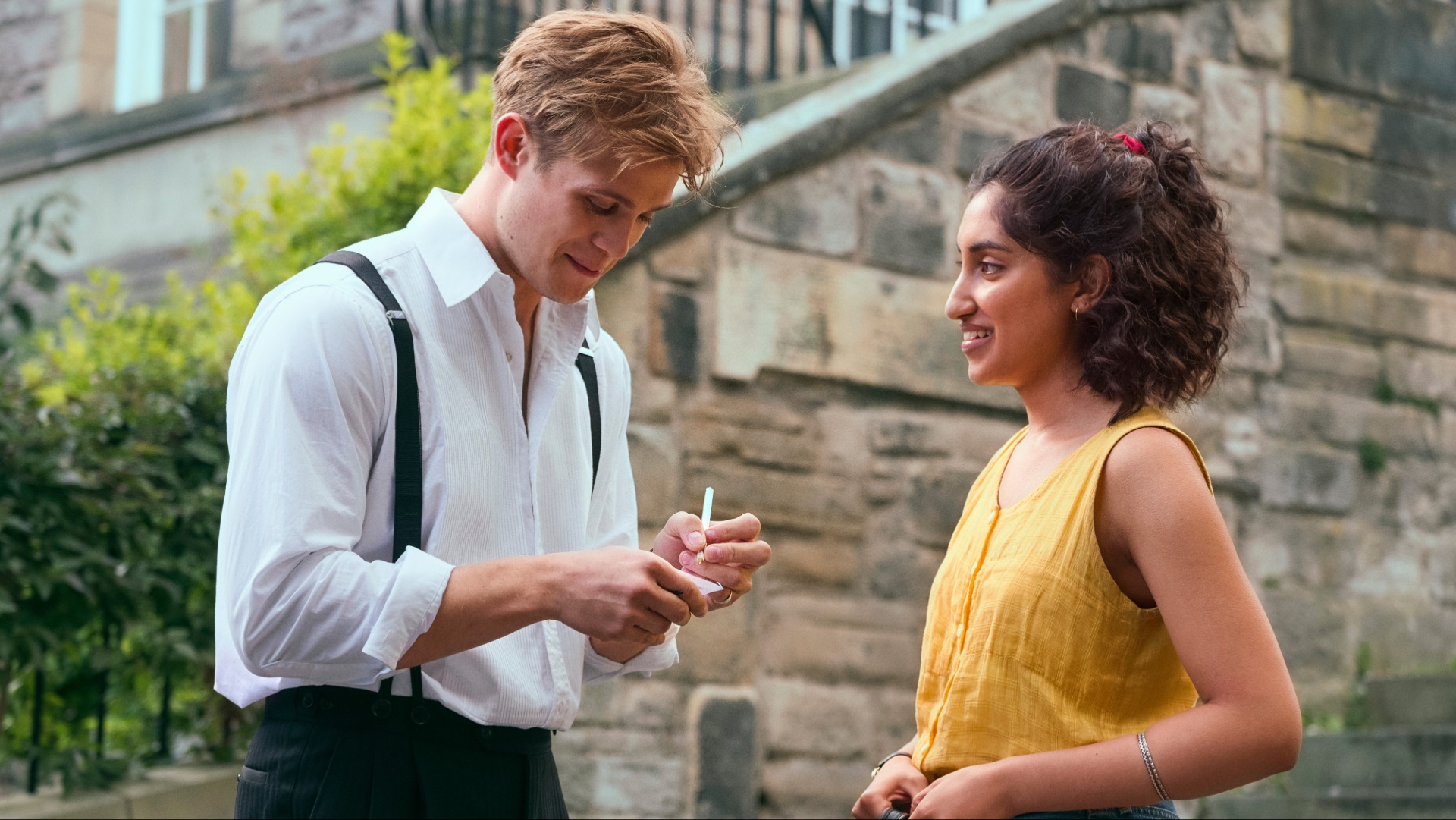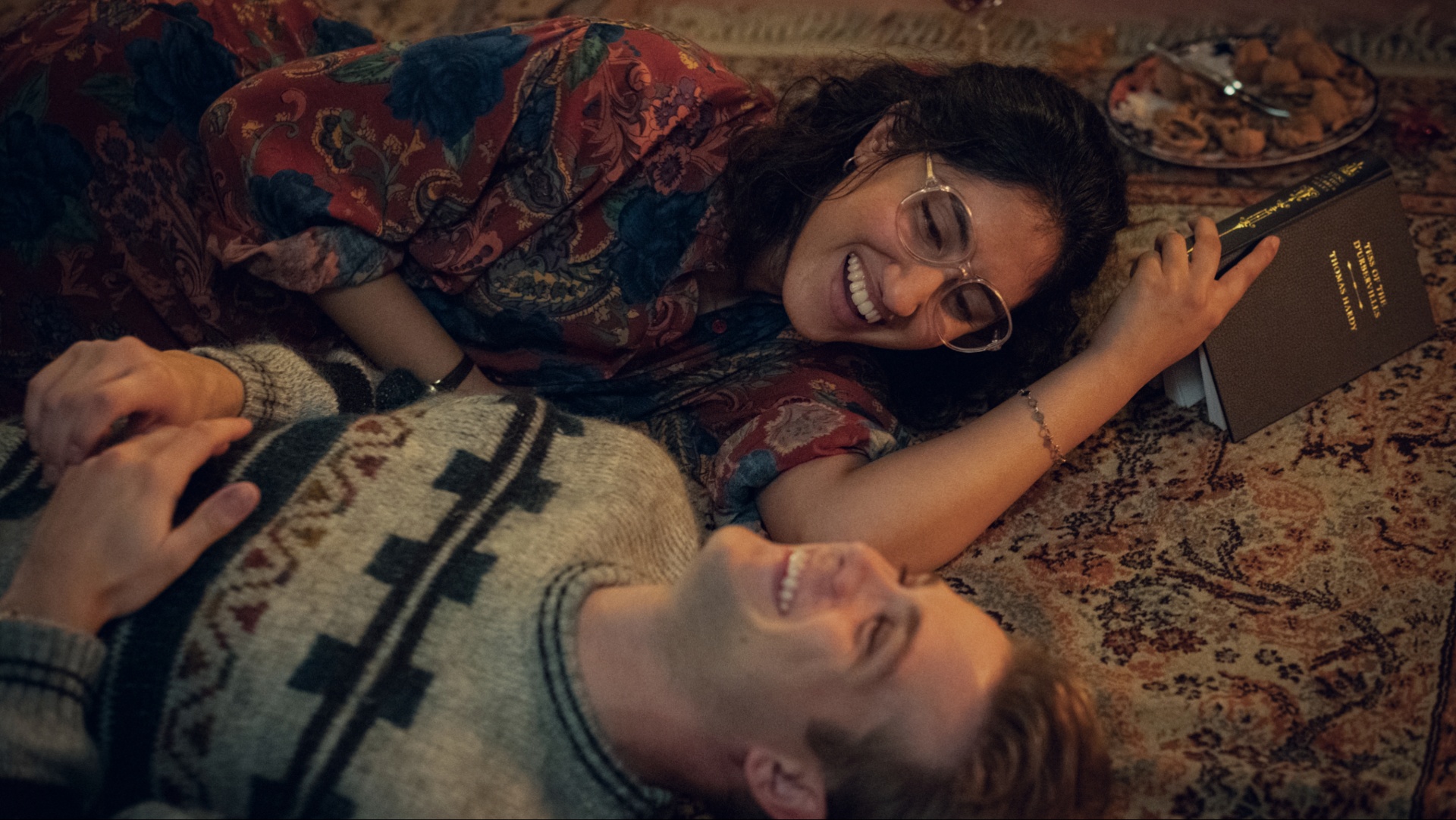
How does friendship shape a life? And how does life shape a friendship? Time passes in fits and spurts in One Day, Netflix's new decades-spanning romantic drama, centering on the will-they-won't-they friendship of Emma (Ambika Mod, best known for playing junior doctor Shruti in This is Going to Hurt) and Dexter (Leo Woodall, a world away from his last small-screen appearance as Essex boy Jack in The White Lotus season 2).
Based on David Nicholls' novel of the same name – which broke my heart when I read it as a teenager – each episode follows Dexter and Emma on the same day in July over the course of nearly 20 years, beginning on the night of their graduation from the University of Edinburgh in 1988. Emma, a straight-A socialist from Leeds, catches hedonistic Home Counties heartthrob Dexter's eye at their grad ball. A night of conversation culminates in a failed attempt at a one-night stand, but a promise to stay in touch overlays a frisson of missed opportunity.
Right off the bat, Mod and Woodall have an easy chemistry, anchoring the time-jumping narrative and making it easy to root for Emma and Dexter. Mod, in particular, is very watchable, balancing Emma's earnest idyllism with a dry sense of humor, the actor's background in comedy bringing an extra layer of bittersweet charm.
Time, just like in real life, speeds up a little towards the end of the series, and so the year-per-episode premise accelerates. There are 14 episodes in total, which fly by with zippy runtimes ranging from 20 to 40 minutes, making it an easy show to binge-watch.
Mid-20s malaise

After Edinburgh, post-grad life sees the pair spend polarizing summers in Rome and Wolverhampton, respectively, before they both start lives in London. Things haven't gone anywhere romantically, but they've kept their word and stayed in touch. However, while Emma is clocking in for soul-destroying shifts at the city's "second-worst Mexican restaurant", Dexter is kickstarting a career in late-night TV.
The show captures the way university class divides become chasms after graduation – the good-natured teasing of posher, wealthier friends becomes decidedly less fun when they walk into high-paying careers without breaking a sweat and you're stuck in a dead-end job with no time or energy to pursue your dreams. One Day skilfully captures the malaise of your mid-to-late-20s, when student optimism begins to wane and you begin to realize it might actually be like this, forever. The series looks at the process of growing up and wonders: is anyone really happy? Well, yes and no. Nothing ever works out quite the way you planned, for better or worse – a truth that rings plaintively but painfully true throughout the series.
Mod and Woodall's appearances don't really change much from episode to episode as the years go by beyond shifting hairstyles and new glasses frames. But you can believe they're older – sometimes wiser, sometimes sadder, sometimes more confident – through the way they carry themselves. It's subtle and artfully swerves descending into gimmicks. Mod, especially, excels at this subtle maturing, moving through each stage of Emma's life with humor and pathos.
To begin with, it seems like Woodall has drawn the short straw – Emma is seemingly the more interesting character, and Mod has better material to play with. Woodall's performance, however, pays off in the long term. Silver spoon-fed Dexter's luck increasingly dwindles and, as a lack of purpose and meaning sets in, Woodall's perfectly honed wounded expression brings subtlety and empathy to what could otherwise be a brash and annoying character.
Emotional truths

A zingy, era-appropriate soundtrack punctuates each episode, but there doesn't seem to be much other purpose for keeping the late '80s to early '00s setting of Nicholls' novel, with period details often feeling inconsequential – and, most heartbreakingly, the show's costuming not having nearly enough fun with '80s and '90s fashion.
Some parts of the script are a little hammy and a brief use of flashbacks in a later episode feels a tad on the nose, but One Day otherwise wears its sincerity on its sleeve and, mostly, pulls it off. The direction is tender, the camera soft on Emma and Dexter's bodies during moments of intimacy. The script's emotional beats, for the most part, walk a realistic line throughout the series – not just emphasizing the highs, but underlining the lows, too. When Emma and Dexter bicker, it captures the tension of butting heads with someone you love, that helpless unintentional clashing when you're moving on different axes during difficult moments.
And there's no shortage of difficult moments, particularly in later episodes. When you can't go on, how do you go on? The characters in One Day experience addiction, grief, feeling trapped in jobs and relationships, and realizing they've wasted too much time. But there are also holidays in the sun; they watch dear friends marry the love of their lives and decide exactly how they want to spend the rest of their lives. When you can't go on, you still do, somehow.
This point is hammered home in a tear-jerker ending that teeters on a knife edge of sentimentality. At this point, though, we're invested in Dexter and Emma. The emotional beats of the finale feel earned and the underlying message, that all we have is each other – present throughout the series but brought front and center during the final episode – elevates the central love story to even greater significance. Life shapes our relationships with people but, more than anything, these relationships shape our lives.
All episodes of One Day are streaming on Netflix from February 8. For more, check out our guide to the other best Netflix shows to fill out your watch list.







